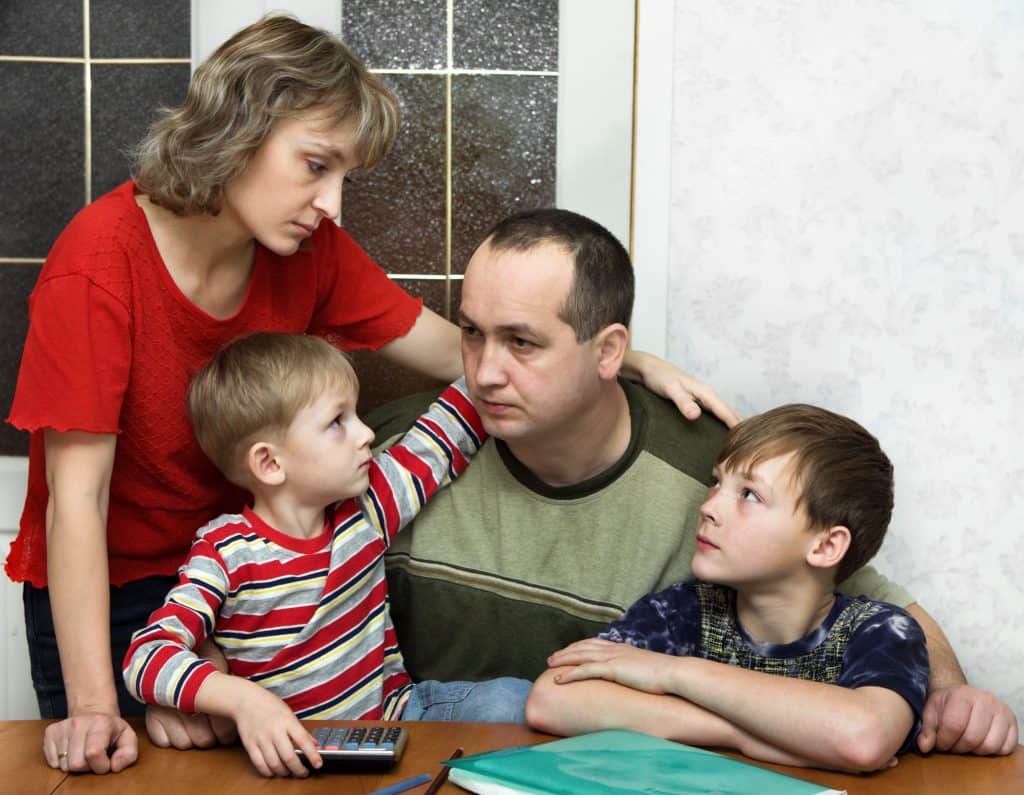Raising children today requires a lot more money and time.
So yes… I can already hear you…
“You’ve got all the technology and progress in the world. If you had to wash your children’s diapers every day, I’d ask you some questions!”
Of course, today we’re lucky enough to have little extras: disposable diapers (or rather, the ecological disaster of the century), phones to keep the kids occupied (or rather, the educational disaster of the century) and ready-made meals (hello diabetes!).
And the list goes on.
I know that every generation of parents thinks that the previous one had it easier. It’s like when you go to school and the teacher says, “You’re the worst generation I’ve ever seen”.
But let’s put it in context.
Education used to be a family affair.

Grandparents were much more involved. It cost a lot less, because children had different needs and desires.
But also (and above all) because moms didn’t work. A parent who is constantly at home is a plus for the family and the children.
For the mother, however, anxiety, stress and depression are guaranteed… But who cares? But who cares? I’m not judging moms who choose to stay at home, because their life’s mission is to raise their children.
On the contrary, my hat’s off to you. But it’s not something everyone can afford, or wants to do.
Clearly, parenting today has become a much more difficult task than it used to be. Indeed, over the generations, the amount of time, attention and money devoted to children has increased considerably.
Mothers who work outside the home spend as much time looking after their children as their unemployed mothers and grandmothers did in the 1970s.
Whereas parents used to spend the most on children in secondary school, today children under six and over 18 cost the most.
Piano, soccer, swimming, martial arts lessons – parents feel obliged to offer their children all of these. Today’s parenting style is therefore generally referred to as “intensive”, as it boils down to constant teaching and supervision of children.
In reaction to this trend, a kind of “resistance movement” has emerged, but there are few brave parents able to face up to fears of economic uncertainty.

The future doesn’t look too bright, so parents try to offer their children the best possible springboard for climbing the social ladder.
As inequality increases and the gap between rich and poor widens, so does parental anxiety. Yes, you didn’t see that argument coming, did you?
The term “parenting” first appeared in the 1970s, when parenting manuals boomed. The 1980s saw the emergence of helicopter parenting, a trend towards constant surveillance of children, influenced by sensationalism and the enormous media attention given to child abduction and abuse.
During the 1990s, the notion of intensive parenting emerged, influenced by changes in the way society began to view children as extremely vulnerable beings whose development was irreversibly affected by every childhood experience – an idea derived from developmental psychology.
The consequence of this change has been a parenting style that puts the child at the center of attention, relying mainly on expert advice, which is emotionally demanding, brings a lot of work to parents and is very expensive.
What’s more, most of the new burden has fallen on mothers.

While the amount of time spent with children has remained more or less the same, the way it is used has changed. Today, mothers spend five hours a week reading to their children, doing crafts with them, taking them to after-school activities and shows, and helping them with their homework.
In 1975, they spent 1 hour and 45 minutes a week. Yet, at the same time, today’s mothers fear that they are not sufficiently devoted to their children.
The free time that parents devote to themselves – socializing or recreation – is increasingly spent in the company of their children.
Unlike today’s overworked, anxious mothers who separate themselves from the obligations and worries of conscience, their mothers enjoyed parenthood much more.
Before, a mother’s job was to love and discipline her children. It wasn’t really about entertaining them. Kids were supposed to have fun on their own.
Now, kids can’t seem to entertain themselves. And we’re the ones to blame. Yes, we moms. Instead of teaching our children independence, we overprotect them.
We invent obligations that don’t need to be because we’re afraid they’ll hurt themselves, get bored or miss out on something.
We’re constantly projecting!

What if, when they grow up, the children start to hate us because we haven’t devoted ALL our time and ALL our love to them?
In the meantime, we forget ourselves completely. We have no time for ourselves or for our relationship. We’re adrift… And we lose ourselves in our role as mother and don’t know how to be a woman anymore.
And depression looms. But above all, we don’t know who we are anymore and we’re constantly unhappy.

Well, hello there!
My name is Jennifer. Besides being an orthodontist, I am a mother to 3 playful boys. In this motherhood journey, I can say I will never know everything. That’s why I always strive to read a lot, and that’s why I started writing about all the smithereens I came across so that you can have everything in one place! Enjoy and stay positive; you’ve got this!

